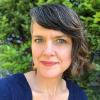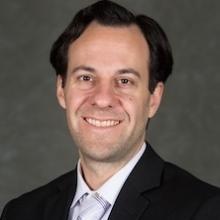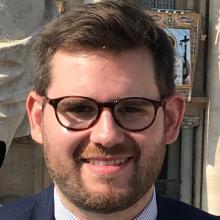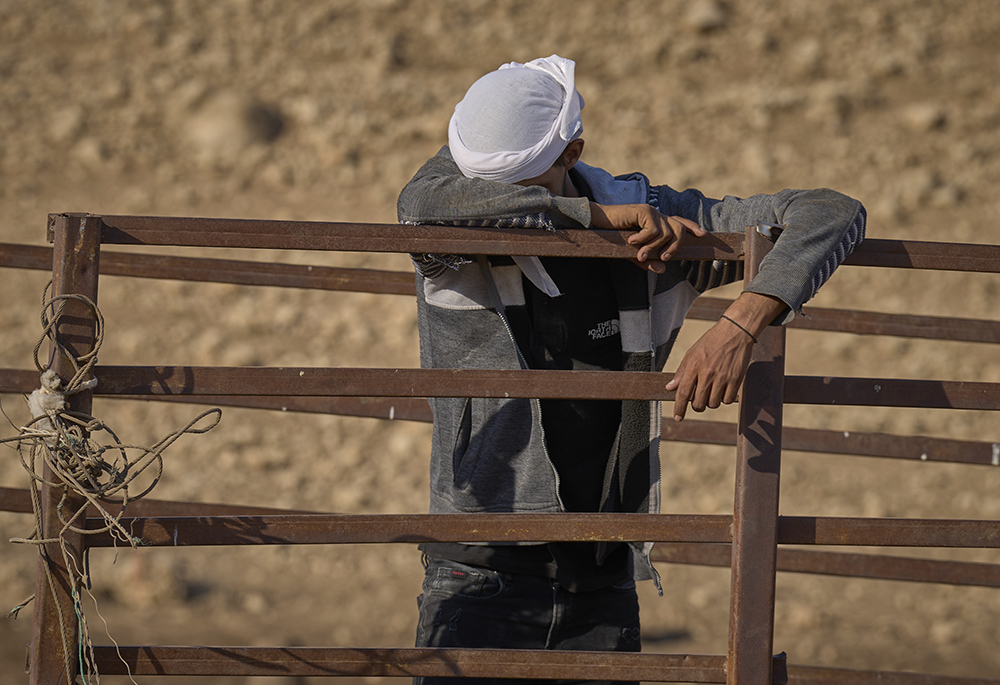
A Bedouin sheep farmer weeps in Uum Jamal, a small West Bank village, as he packs up his family's belongings Aug. 16. Israeli settlers harassed and threatened the community for a week, finally convincing them to leave. A Christian delegation from the U.S., which included Catholics, provided a protective presence as the farmers evacuated. (Life on Earth Pictures/Paul Jeffrey)
A day after Israeli settlers attacked a village in the occupied West Bank, setting houses and cars ablaze and killing a Palestinian, members of a nearby Bedouin herding community abandoned their village of Uum Jamal in fear.
The women and children had already fled with sheep, cattle and other livestock, and on Aug. 16 a group of men quickly hoisted bags of animal feed and household belongings onto truck beds and trailers.
One young man, overcome with exhaustion and grief, broke down in tears.
"They had not been sleeping because they didn't know when the next attack would occur," said Bob Shine, one of six Catholics in a 12-person Christians for Ceasefire delegation that spent Aug. 13-20 in Israel and the Palestinian territories.
The Palestinian death toll just surpassed 40,000 amid the ongoing war in Gaza — a conflict some international human rights observers and legal experts describe as genocide — while land grabs and extremist settler violence in the West Bank have escalated.
Eli McCarthy, a member of the delegation who teaches at Georgetown University and is an expert in nonviolence and restorative justice, said the group's goal was to support and encourage people under attack, expose human rights violations, and strengthen "U.S. Christian advocacy for a just peace."
Villagers in Uum Jamal told the U.S. group how people were beaten and women were sexually harassed by settlers, Shine told NCR in a phone call from Jerusalem. Children were so frightened they vomited.
Christians for Ceasefire, a coalition that includes the Catholic peace movement Pax Christi USA and the Franciscan Action Network, was invited to the region by Palestinian Christian leaders.
"We deeply appreciate the prayers offered from afar, but now, more than ever, we need our Christian sisters and brothers to join us here, to pray with us, to walk with us," the invitation letter said.
Individuals from Sabeel, an ecumenical liberation theology movement of Palestinian Christians, joined the delegation, which over the course of a week met with religious leaders and families of Palestinian prisoners, participated in interfaith prayer, spoke with Israeli organizers supporting families of hostages and prayed near the Gaza border.
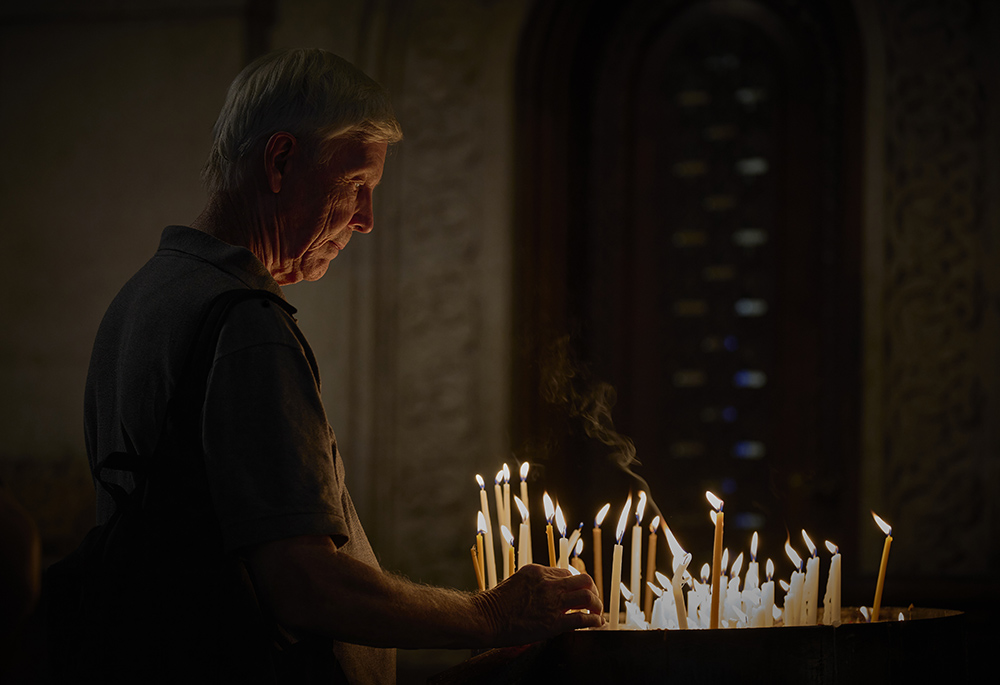
Scott Wright, a member of Pax Christi USA, lights a candle in Jerusalem's Church of the Holy Sepulcher Aug. 14. Wright and other members of a visiting delegation of U.S. church activists came to the Middle East to accompany threatened Christians and other Palestinians and call for a cease-fire in Gaza. (Life on Earth Pictures/Paul Jeffrey/)
The delegation also engaged in a nonviolent strategy known as "protective presence" while the Bedouin community evacuated. Activists employing the strategy remain with civilians under attack to reduce the likelihood of harm.
Participants in the Christian delegation said in Uum Jamal they were harassed by Israeli soldiers and settlers, the latter driving through the village on ATVs and motorbikes "as an intimidation attempt," said Shine, a member of Pax Christi USA and an LGBTQ activist. But the villagers were able to remain safe and continued packing their belongings.
Just as the group completed its Middle East trip, the Democratic National Convention got underway in Chicago, and protesters gathered to express opposition to the war.
The newly released 2024 Democratic Party platform reasserts the party's commitment to provide support to Israel in "the fight against Hamas" as well as achieve "meaningful progress and a political horizon for the Palestinian people."
President Joe Biden backed a new cease-fire proposal in August, but neither Israeli Prime Minister Benjamin Netanyahu nor Hamas have agreed to it yet.
A Christians for Ceasefire press release calls Biden and Vice President Kamala Harris, the Democratic presidential nominee, "to not merely urge a permanent ceasefire, but also to withhold further arms shipments to Israel for the leverage to achieve such a ceasefire." It additionally calls for the release of all political prisoners and hostages and an end to the Israeli occupation.
The United States is Israel's biggest supplier of weapons, and it ramped up its deliveries after Oct. 7, when Hamas fighters killed more than 1,200 people in Israel and seized more than 250 hostages, including children.
Israel's ensuing military campaign has led to an unprecedented humanitarian catastrophe in Gaza, and reports in August indicate a new threat — polio — is increasing rapidly.
Prior to the war, Israel was significantly expanding its presence in the occupied West Bank, a region that, along with the Gaza Strip and east Jerusalem, Palestinians seek as part of a future state.
The country's occupation of the West Bank, east Jerusalem and Gaza began in 1967, and Israelis subsequently have built about 160 settlements, communities considered illegal by many in the international community.
Settler violence and land grabs are part of an ongoing effort to impede the creation of a Palestinian state, but aid groups say the violence has increased in the past year. Since last October, Israeli forces and settlers have killed more than 550 Palestinians in the West Bank, including east Jerusalem, according to the United Nations.
Israel Defense Forces say they do not support or allow settler violence.
Shine said that what the delegation witnessed and heard in the village of Uum Jamal was not unique. "This is happening every day in the West Bank," he said.
The goal is potentially to have future delegations "build up the capacity for nonviolent presence that might slow or stop some of the violence or at least provide some safety," said Shine. "But on the other hand, we were trying to do our best for this one small village."
Several other groups have successfully provided unarmed civilian protection in occupied Palestinian territories, including at checkpoints, and have interrupted Israeli settlers from blocking humanitarian aid into Gaza, according to McCarthy.
As part of their trip, the delegation visited a refugee camp, packed shipments of food for people in Gaza, and shared a meal with a husband and wife whose home was demolished in east Jerusalem; nearly 1,500 Palestinian-owned structures were destroyed over the past year, according to the U.N.
The delegation also met with staff at the U.N. relief organization for Palestinians. The agency provides health, education and aid to millions of Palestinians in the West Bank and Gaza, as well as in Syria, Lebanon and Jordan. In July, the Israeli parliament passed bills to close the organization, asserting it has many terrorists on staff. Israeli leadership, however, has not provided evidence for the claim.
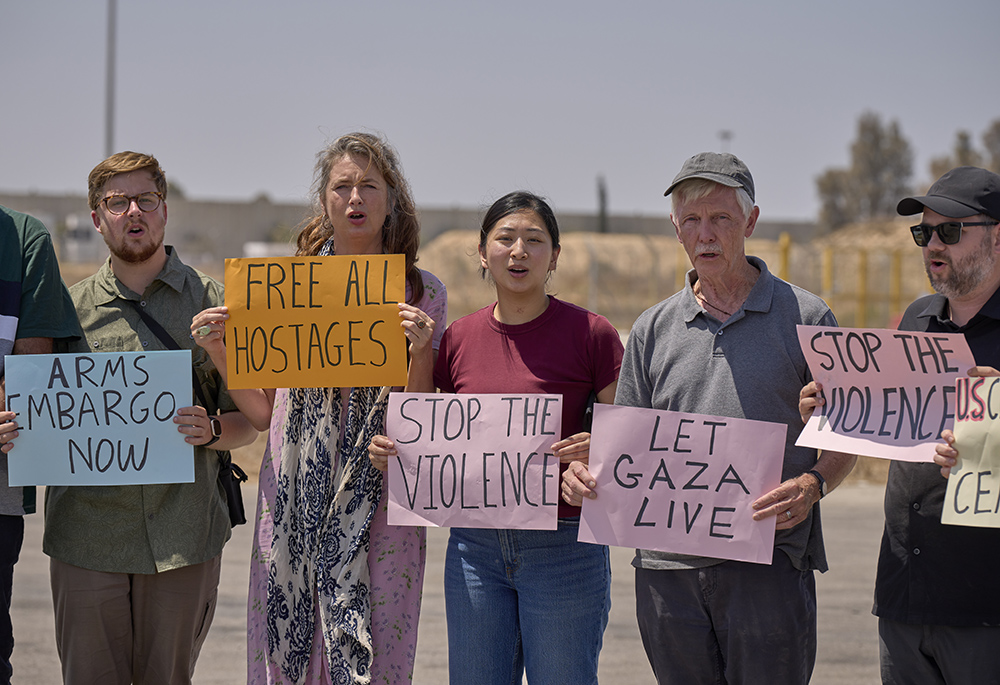
A delegation of U.S. Christians holds a prayer vigil Aug. 18 at the Kerem Shalom crossing on the border between Israel and Gaza. "Amidst the tension, distrust and trauma, Jesus' way of courageous nonviolence offers a path to break the cycle of violence and cultivate a just peace for all people," said participant Eli McCarthy, a teacher at Georgetown University and expert in nonviolence and restorative justice. (Life on Earth Pictures/Paul Jeffrey)
On Sunday, Aug.18, the Chrisitan delegation assembled in a military zone near a crossing into Gaza to pray, read Scripture and hold signs calling for an end to violence.
Earlier in the day, members participated in an interfaith prayer service with Rabbis for Human Rights and a Muslim sheikh at a synagogue near Gaza, less than a mile from the beleaguered Gaza city of Khan Younis.
While the group was praying, an air siren went off and bombs could be heard in the distance, according to participants. They said they dropped to the ground and placed their hands over their heads before finishing prayer.
"As I laid down on the asphalt, the first prayer that came to mind was just a deep apology," Shine said. "I grieve that as a U.S. citizen and taxpayer it is my government that has enabled the genocide to continue through our weapons and diplomatic cover."
Shine said he prayed the Lord's Prayer and repeated over and over: "Deliver us from evil, deliver us from evil."
"The suffering these weapons create was clear in the many encounters we have had here," added Ken Butigan, a Catholic professor at DePaul University in Chicago who teaches peace, justice and conflict studies.
'As I laid down on the asphalt, the first prayer that came to mind was just a deep apology. I grieve that as a U.S. citizen and taxpayer it is my government that has enabled the genocide to continue through our weapons and diplomatic cover.'
—Bob Shine, Pax Christi USA
Several faith-based groups, such as Rabbis for Ceasefire and other Catholic and Christian delegations, also traveled to Israel and the Palestinian territories in recent months, and a number of religious leaders, Pope Francis and U.S. bishops among them, have issued pleas for a cease-fire.
Hundreds of Catholics, including Cardinal Robert McElroy of San Diego and Archbishop John Wester of Santa Fe, New Mexico, signed a letter this spring calling for Biden to do "everything possible to ensure a permanent end to hostilities." Catholic organizations have also held small demonstrations and vigils outside the White House demanding a cease-fire.
Over the course of the recent weeklong delegation, Shine said he was moved by the "deep well of hope and faith" that allows the Palestinians he encountered "to keep going, even as they face forms of repression and sometimes violence."
"I think all of us," he said, "will take that back home with us to our activism in the United States."
